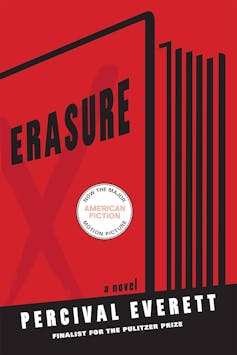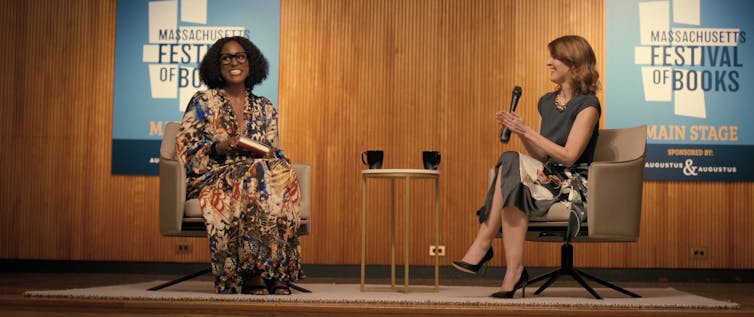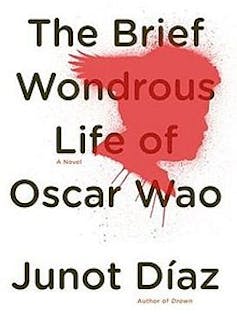
The recent Oscar-winning movie American Fiction – an adaptation of Percival Everett’s novel Erasure by screenwriter and director Cord Jefferson – is a scathing look at the racial stereotyping prevalent in the publishing industry.
In one scene, Theolonius “Monk” Ellison (played by Jeffrey Wright) participates in a literary panel to promote his new book. The event is woefully under-attended. Monk then decides to join the crowds for celebrated black author Sintara Golden’s sold-out session. Golden is promoting her book We’s Lives In Da Ghetto. She gives a reading in an overtly black vernacular, to the audience’s delight and Monk’s disdain.

In another scene, Monk and his literary agent are on the phone with a publisher interested in purchasing Monk’s latest novel. Its title is My Pafology. Monk has written it as a joke, a satire of black stereotypes, but the publishers mistake it for serious literature. At his agent’s insistence, Monk speaks in “black” parlance to them, in keeping with his pseudonym Stagg R. Leigh. He sounds “street”. He sounds “real”. The publishers love it.
Such scenes proliferate in American Fiction. As an academic, an intellectual and the author of several books, Monk faces the reality of having to fake-write the kind of book “they want”. The satire highlights the deeper issues around what the book industry considers “authentic”, and the burden it places on African-American authors.
Monk resists the requirement that he has to “write black” and even “talk black” to be a spokesperson, that he must represent his racial experience. But the more he resists this pressure – by moving his books to another shelf in a bookshop or refusing (initially) to accept the publisher’s bid – the more the audience becomes aware of the restrictions on his self-expression.
“Look at what they publish.” Monk says. “Look at what they expect us to write.”

Literary personas
Fictional writers, like Monk and Sintara Golden, satirise the reality faced by authors of colour, who are expected to perform a version of themselves in public and, paradoxically, end up adopting a persona – a supposedly “authentic” but in fact phoney persona – for the benefit of readers, literary gatekeepers and other industry players.
Reductiveness in the name of “authenticity” is not specific to the American market. Global literary discourse also requires authors of colour to produce ostensibly “authentic” narratives. They are then required to embody this “authenticity” when presenting themselves in public.
But are such narratives predetermined by race, ethnicity and language? Who qualifies as an “authentic” author? The demand for “authenticity” – within literary culture, in particular, and postmodern culture in general – has become a problematic, paradoxical idea. Authors are now expected to depict an authentic experience – and yet the form of such authenticity is pre-determined on their behalf.
There would seem to be several underlying reasons for this. One is that contemporary literary culture tends to equate the author with the worlds they create in their books, expecting them to align. Laura Mandell, an assistant professor of English, argues that
whenever we talk about “great literature” using an author’s name, we confuse people and texts, subtly reinforcing the unconscious idea that authors are literature rather than that they wrote it. The ideology of authorship fosters such a confusion, and it simultaneously imposes expectations on people as to how to behave.
Another reason is the way book publication automatically renders the author a public figure. Even if this is expressly resisted, as in the case of Elena Ferrante, whose real identity remains uncertain, it only further underscores its ubiquity.
Authors of colour often employ personas as means of navigating these expectations. At a literary event in Hong Kong some years ago, I interviewed Junot Diaz on his views around his identity.
Diaz is the Pulitzer Prize-winning author of The Brief and Wondrous Life of Oscar Wao, a recipient of a MacArthur Genius Grant, and a professor of Creative Writing at Massachusetts Institute of Technology. His writing voice employs a mixed register of Spanglish, nerd jargon and taboo slang – perhaps an amalgamation of Monk and Golden. Here is his response, verbatim:
I’ve always told people that you know whatever your formula is about being Dominican, about being African diasporic, or being poor or being from New Jersey or being an immigrant, whatever your formula is, please, safely put me outside of it. Whatever your test is, I have failed. Really, I have failed. I am so much happier to fail everybody else’s formulas, to not belong, that’s my joy, although I am deeply embedded in my community, even though I feel strongly related to my community.
My poor girlfriend feels like she’s living some crazy Dominican nightmare, 24/7. Everybody’s fucking Dominican in my world, so, she’s like what the fuck am I doing with this guy? Even with all these things, I will still argue that whatever people’s reductive formula about what authentic is, of a Dominican person in New Jersey, I don’t want any part of it.

Diaz’s uneven, mixed register of street vernacular and academic lingo is a strategic performance. His persona acknowledges both his racial and class background, and his transcendence of that background through his literary accomplishments.
He is, however, also indicating that he is “keeping it real”, that he is still a part of his community, while not accepting the “reductive formula” around his identity.
Like Monk in American Fiction, Diaz resists being pushed into a finite category around race or ethnic identity. At the same time, he is performing that identity in his manner of speech, the same way Monk is asked to speak as “Stagg R. Leigh” over the phone. Even when he is denigrating the idea of his pigeonholing, he is enacting it.
Another example is from an interview with Madeleine Thien, Booker-nominated author of Do Not Say We Have Nothing. Thien’s prose, unlike Diaz’s, is spare and lyrical, focusing on small moments. Also unlike Diaz, Thien in real life embraces her pigeonholing, almost weaponising it.
When I interviewed her about reviewing culture in Canada, she also enacted a persona, but in a different way. “I used to feel frustrated and sad by the misreadings of works by writers of colour,” she said:
[Reviewers] make such sweeping generalisations about a place, and what they think the literary culture is, when they actually have possibly not read a single book about Vietnam, or whatever it is, you know, about Lebanon, about China, even, I mean, most people have not read a single novel set in China and yet when they sit down to write that review, there’s no conception that they are out of their depth. Because if you know you’re out of your depth, you can’t really write a really sensitive and interesting critique that comes from that place, you know?

The paradoxical nature of contemporary literary discourse around “authenticity” requires Thien to perform her activism, her outrage, her wielding of identity politics, her sense of responsibility to the rest of her ilk. It’s the prescribed social self of the “real” author.
But instead of claiming her “authenticity” is not up for discussion the way Diaz does, Thien discusses her responsibility to the larger culture. She wields her identity and power of representation (perhaps in some ways like Sintara Golden), performing the outrage expected of her in the diversity conversation.
True to oneself?
The idea of being true to oneself now extends into identity politics. It pigeonholes writers to produce a certain type of narrative. It’s not write what you know; it is write what only you know. Deviation renders the work (or worse, the writer) inauthentic – one of the last taboos of postmodern culture.
In one of the later scenes in American Fiction, Monk and Golden have a quiet lunch together in a miserable room. They have been brought together as jury members for a literary prize. Curious about Golden’s contempt for his hoax-novel Fuck, Monk gently suggests Golden’s writing is guilty of the same pandering.
The questions are also from the audience. How did she catch that the writing panders? What did she see in it that was disingenuous? And is she perhaps aware of the disingenuousness in her own work? Is she pandering on purpose?
The film refuses us the satisfaction of an answer. Golden merely throws Monk’s query back at him. She implies that his perspective comes from a position of academic privilege, making him unaware of the realities of black life. It is an irony in the context of the film, but it also confirms how Golden views her own role in the industry, and how she views being “authentic”. Monk and Golden, like Diaz and Thien, both make choices around authenticity. Their opposite responses are both true.
I was in touch with the authors I interviewed, Junot Diaz and Madeleine Thien, while doing my PhD.
This article was originally published on The Conversation. Read the original article.







